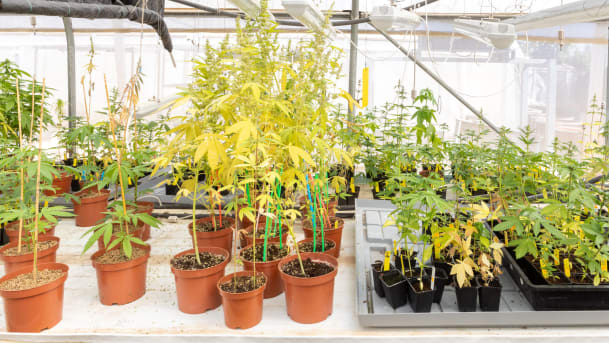You are here
Home 🌿 Medical Cannabis News 🌿 Veteran Israeli medical marijuana firms weigh going public 🌿Veteran Israeli medical marijuana firms weigh going public

Now that the Israeli government has approved cannabis exports, the Tel Aviv Stock Exchange may be getting a new crop of medical-marijuana companies seeking a listing. In contrast to most of the speculative companies already trading on the exchange, the newcomers have a real industry track record.
Export approval, which goes into effect in April, has suddenly created huge new potential for the industry, which until now has been limited to the domestic market. Moreover, closely held medical-cannabis companies have seen how their publicly traded peers have soared to markets caps in the hundreds of millions of shekels and they want a piece of the action.
TheMarker has learned that Seach Medical Cannabis Group, which grows cannabis and sells it in Israel for medical uses, is exploring an initial public offering to provide its expansion capital. Ilan Bio, an agro-biotechnology company focusing large-scale in vitro plant propagation and cloning technologies, is working on becoming a publicly traded company, too.
Until now the companies traded on the TASE have enjoyed huge speculative interest from investors as the government debated approving exports or not, but the companies themselves were not growing or selling medical cannabis. All they had were licenses (and in some cases temporary ones) to grow and sell it and business plans.
“There is some resentment by older, active companies, who feel as though they nurtured the industry for years and it was business people who have reaped the rewards. They will have to show that they can raise money,” said Ilan Gerzi, a senior partner and chair of the capital markets and securities group at the Tel Aviv law firm Pearl Cohen. He represents most of Israel’s medical marijuana companies.
Many market players told TheMarker that the rally in the zombie medical-marijuana companies has harmed the public’s perception of the industry. But if the new crop of companies succeed in going public it will mark a step higher for the TASE’s cannabis sector and provide better opportunities for investors.
“It’s already been several months that [securities[ underwriters have been approaching us about a share offering, but until now we weren’t so interested in it,” said Yogev Sarid, one of the principals in Seach.
“We’re now looking into it more seriously now that exports have been approved. The disadvantage of doing it is mainly personal, turning a family company into a public company. Nevertheless, over the last year-and-a-half or two we’ve been acting like a business and we no longer make decisions over Friday night dinner,” he said.
The advantage veteran companies have is they already have years of experience growing and developing medical cannabis. What they don’t necessarily have is the profits to justify the valuations TASE investors have assigned them.
Seach has been in the business since 2008 and according to official data in 2015 it held an 11% market share of the Israeli domestic market of 45,000 regular users. The company says its share has since grown to an estimated 15%.
“We’re talking about a positive development for the sector, which will only continue growing,” said Gerzi.
“Companies were under a cloud of suspicion on the bourse, but that has eased recently a bit. Now there’s a sense that this isn’t just a passing fancy but something that will only keep expanding. I think we’ll even see foreign companies, mainly American and Canadian, buying Israeli companies or at least invest in them,” Gerzi said.
In addition to more companies listing on the TASE, the investment community is becoming more sophisticated about assessing them, he said.
“Slowly, we’re starting to see they are getting a deeper understanding of each companies, also by analysts, Companies that are already trading and have experience will start the process of raising capital in the United States and Canada. Export approval was important for potential foreign investors,” Gerzi said.
That said, he added that he expected medical-marijuana companies seeking a listing to avoid an actual IPO and continue the practice of merging into publicly traded shell companies. “The IPO process requires meeting very strict regulations and meeting stringent stock market rules,” Gerzi explained.
One way they could get around that is to use the TASE’s track for listing research and development companies, for which the capital and other requirements are more modest than they are for other companies going public.
However, companies need to show they have invested at least 3 million shekels in R&D over the last three years before the offering. Gerzi said he doubted even the oldest medical marijuana companies spent that kind of money on R&D.
420 Intel is Your Source for Marijuana News
420 Intel Canada is your leading news source for the Canadian cannabis industry. Get the latest updates on Canadian cannabis stocks and developments on how Canada continues to be a major player in the worldwide recreational and medical cannabis industry.
420 Intel Canada is the Canadian Industry news outlet that will keep you updated on how these Canadian developments in recreational and medical marijuana will impact the country and the world. Our commitment is to bring you the most important cannabis news stories from across Canada every day of the week.
Marijuana industry news is a constant endeavor with new developments each day. For marijuana news across the True North, 420 Intel Canada promises to bring you quality, Canadian, cannabis industry news.
You can get 420 Intel news delivered directly to your inbox by signing up for our daily marijuana news, ensuring you’re always kept up to date on the ever-changing cannabis industry. To stay even better informed about marijuana legalization news follow us on Twitter, Facebook and LinkedIn.




